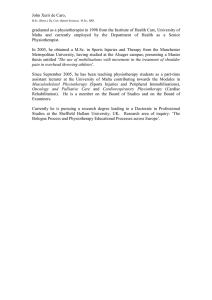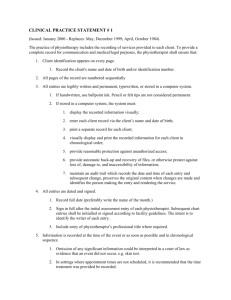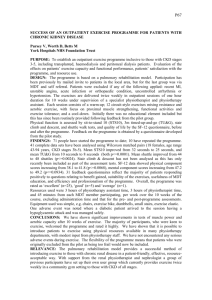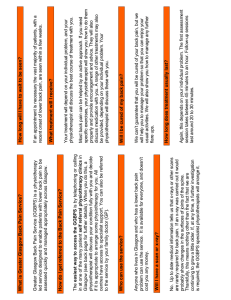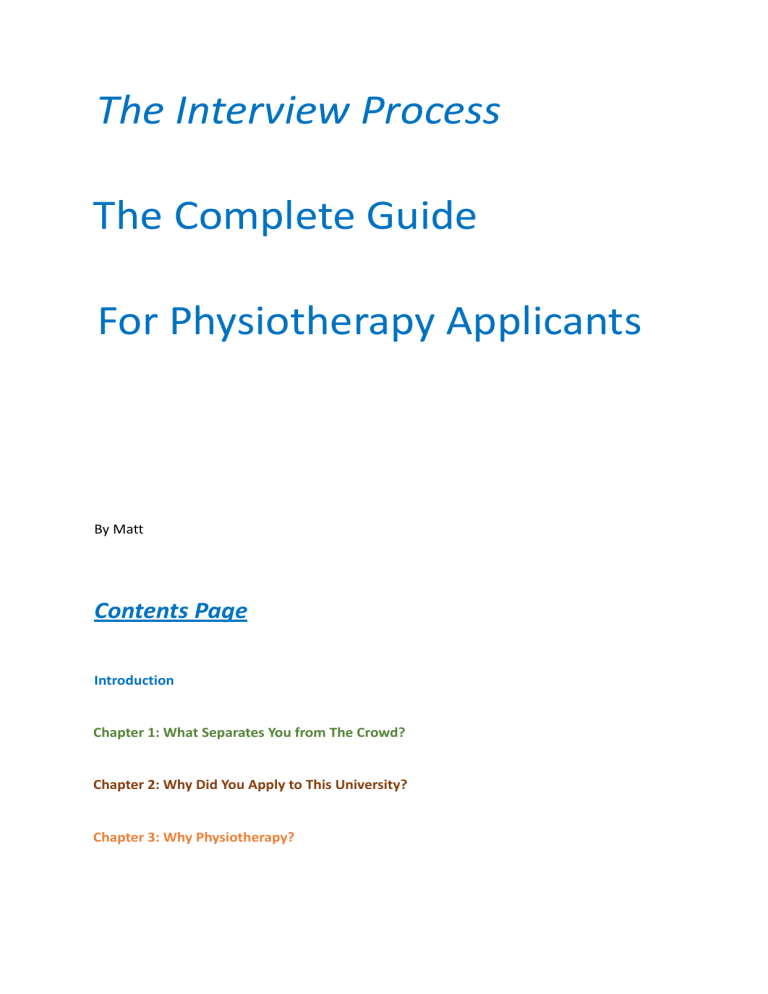
The Interview Process The Complete Guide For Physiotherapy Applicants By Matt Contents Page Introduction Chapter 1: What Separates You from The Crowd? Chapter 2: Why Did You Apply to This University? Chapter 3: Why Physiotherapy? Chapter 4: Skills That Would Make a Good Physiotherapist Chapter 5: Bonus Questions Final Thoughts Introduction Hello, If you are reading this, then it means one of 3 things: 1. You are going to apply for a physiotherapy course at university 2. You have applied to a course already, and now you’re awaiting an interview 3. An interview for your desired university course is imminent First off, let me just say that you have made a good investment in purchasing this E book. It shows that you are serious about becoming a Physiotherapist, and in this instance, investing in yourself will give you the best chance of success. So welcome to the most complete guide to the interview process for a physiotherapy course. What should I wear? First impressions really do count! So, it goes without saying that you should dress smart. This means that gentlemen, you should wear a suit or at least smart, ironed shirt and trousers. Ladies wear correspondingly smart attire (e.g. a longer dress or skirt that goes past knee length and a blazer). Ultimately, dressing for an interview does come down to common sense. What does a typical interview look like? Shortlisted applicants are invited to attend a selection day at the university. The day will consist of some talks about the university course, a group interview/activity and then will conclude with an individual interview. What is the point of the interview process? The physiotherapy course requires an interview because the profession itself requires excellent communication skills. You might be an absolute genius and have all the knowledge about physiotherapy & rehabilitation, but unless you can pass on this knowledge in an appropriate manner to a patient, they are not going to be able to benefit from it. What are interviewers looking for? Interviewers are usually members of faculty or staff at the university, accompanied by a qualified allied health professional (e.g. a nurse, OT, or Physiotherapist). Interviewers are looking for individuals with the qualities necessary to be a physiotherapist: a caring attitude, compassion, kindness, quick-thinking, time management. It costs money to train a physiotherapist, and the interviewers have to be convinced that they have found someone who will work hard on the course, be unlikely to drop out, and most importantly will become the best clinician. Who am I? And why on earth should you listen to me? My name is Matt Chong and I am a HCPC registered, CSP chartered Physiotherapist. I completed my MSc Physiotherapy (Pre-Registration) Course at the University of Southampton in January 2020. I also had an interview at Brunel University for a similar course, in which I was also offered a place. The application process for Southampton was not easy and with over 300 applicants, only 80 were shortlisted for an interview. Then out of that 80, only 16 individuals would receive places. Fortunately, as a result of all the preparation I had done for my interview process, I was one of the 16 to receive a fully NHS funded place at one of the top universities in the country (As of 2019 it is now ranked first for physiotherapy in the UK). When I started my course in January of 2018, I also decided to start a YouTube channel ‘Matticus VLOGS’, where I would make videos giving advice and tips on how to apply to a physiotherapy course as well as showing people what life was like for a Physiotherapy student in the UK. Through the channel I was able to help so many people get into the university course of their choice, and I had countless emails and messages flood in thanking me for the help I had provided (below are just two examples but there are many more). I wanted to write this E book to give you the best tips, advice and share all my knowledge so that you can excel at your interview, which will then lead to you succeeding in getting your place on the course. This E book will talk you through and will help you understand exactly what interviewers actually mean when they are asking you certain questions. This book also contains many practice questions with model example answers. I hope you enjoy this book and that you get a lot from it! Matt Chong Chapter 1: What Separates You from The Crowd? As it might already be clear to you, physiotherapy is a competitive course to get into. There are hundreds of applicants all competing for a place at the same university. In my case it was over 300 applicants, and 80 invited for an interview. After shortlisting, it all comes down to the interview. Grades are no longer a factor. If you have managed to get past the shortlisting phase and have been invited for an interview, then you are still competing against many other people (1 place per 4 applicants). So, with that established, it is really important that you distinguish yourself from everyone else. In a sense, you are a salesperson who is trying to convince the buyer (the interviewer in this case) to accept you onto the course over the other candidates. Think about all your experiences (paid and voluntary work), any training courses, things you have learnt as well as all your skills and attributes. Write all of this down on a piece of paper. Now think, which of these are unique? Which of these would make you stand out compared to someone else? How may these skills make you a good student, and a good physiotherapist? Try to make it relevant. For example, if you are someone who did a lot of extra-curricular activities at school whilst still achieving top grades, then you could say that you have excellent time-management skills. This would be essential as a physiotherapist because there is a number of tasks and a list of patients to see and only a finite amount of time in the day to see the patients/complete the tasks etc… An example Question Tell us a little bit about yourself? Or tell us about your journey so far? This is usually an icebreaker to lighten the mood and to make you feel more comfortable. Use this opportunity to build rapport with the interviewers and to make yourself more personable. Be honest. Interviewers want to see what kind of person you are, they don’t care what you know or how clever you are/think you are. This question is to get a sense of your personality. Example answer “I am a well-rounded individual, who despite having good academic achievements, also enjoys playing a lot of sport and also has a passion for music.” Think about any hobbies you have and don’t be afraid to share them. It is important to show that you have a good work-life balance and that you aren’t simply “married” to your job. Hobbies can also show that you are an interesting person, and potentially gives you more opportunity to convey your passion about that activity to the interviewer, which ultimately will help with building good rapport. How would your friends/colleagues/housemates describe you and why? This is a typical question that interviewers may throw at you. Essentially, they want to get a glimpse of what you are like as a person. You want to keep it short and snappy. Answer the question directly and provide the evidence for it. Example answer “They would describe me as the planner. I am always the one organising get-togethers and events. I bring people together. I suppose this has been the case since a young age. When I was 12 years old, I arranged a trip to Thorpe Park for some of my friends during the summer holidays. I remember sorting out the dates, bookings and even calling my friends’ parents to basically ask permission for them to go. The only thing I couldn’t sort out was transport, as I was unable to drive at that time. In the end, we all had a wonderful day. I still have a photo and a key ring of all of us somewhere in my room.” What are your strengths? Ensure that the way you answer this question is relevant. Consider what the interviewer is looking for. You want to show that you have qualities that an excellent physiotherapist would have kindness, compassion, creativity, time-management and problem-solving skills. We will go into more depth about this in chapter 4. You also want to show that you are a determined individual who will persevere though difficulties. The interviewers do not want someone who will quit at the first sign of a challenge. A Physiotherapy course at university is NOT easy. Example answer “My strength lies in my strong-willed and determined nature. An example of where I demonstrated this was when I trained for my first amateur kickboxing fight in 2016. I had been training kickboxing mainly for fitness, but the opportunity arose to have my first amateur bout. I was actually very nervous for this event however, I wanted to challenge myself and decided to take part. The training was tough (6 days a week with Sundays off), and I had to stick to a regimented diet in order to make a certain weight class for the competition. At the time I was also doing my undergraduate degree in Biology and was preparing for 2nd year exams at the time. So, this was all a balancing act of study, train, sleep and repeat. In the end, all my training, dieting and sacrifice was worth it because I won my fight. This proved to me that I have the determination, work ethic and courage to pursue whatever I set my mind to.” This shows consistency, discipline, perseverance through hardship, and good time management skills. Think of a time where you showed some of these traits and prepare your own model answer. What are your weaknesses? This is a really challenging question because on the one hand, you want to be genuine with your interviewer. However, you also don’t want to say you lack some of the qualities necessary to be successful on the course. Basically, you don’t want to give them a reason to write you off. The trick here is to start with a positive, then talk about what you could improve on (your weakness) and then end with a positive again to show how you have taken the initiative to improve upon that weakness. Example answer, “As someone who cares a lot about other people, I have realised that I have always been more affected by emotional insult than physical. The most challenging placements I faced were working with the very elderly or very sick. I found it difficult when I witnessed so much death and suffering up close. I had bottled up these emotional burdens because I was afraid of being vulnerable. I see now that seeking support and opening up to talk to others (friends, family, colleagues) about how I am feeling, results in a far healthier emotional and mental state.” How do you maintain a good work-life balance? This is a typical question that comes up in interviews. It is an opportunity to show you are devoted to your job, but also that you are an interesting individual with hobbies. This is the only time where you might tell a “white lie” and say you have a hobby that you might not actually have. A word of caution is to not tell too many of these “white lies”. I am banking on the fact that you do have a unique interest that you are passionate about, and that you can talk about in an interview. Example answer “After a day of work, I like to unwind by attending a breakdancing class. It’s a good way of keeping fit and getting quite strong. I enjoy learning to move my body in ways that I never thought I could. I also realise it is important to separate my work life and social life, so on Friday and Saturday evenings I often meet up with friends for a meal. We spend time catching up on the week that has just gone by.” Chapter 2: Why Did You Apply to This University? A common question you will be asked is “Why do you want to study here?” The most important piece of advice that I can give is to do your research about the university and the course. Study the values of the university. For example, if the university is known for its research then you could mention that at the interview, and then discuss a recent area of research that interests you. And from that you could then outline why this is something that appeals to you. Make sure you link it back to why you wish to apply to the university course. A word of caution… this is not time to tell any white lies because the interviewer WILL probably be able to tell if you’re lying. Example answer “The university of Southampton is known for its research and innovation. Particularly in the area of musculoskeletal biomechanics. The shoulder joint has always been an area of interest for me, and I know that Dr Martin Warner has carried out considerable research on scapular kinematics. Namely, one of the papers he worked on looked at scapular dyskinesia in disabled tennis players. It was interesting to see that professional tennis players in wheelchairs reported no shoulder pain or impingement issues, and that this could be attributed to slightly different scapular kinematics compared to players that were not in wheelchairs. I know that the University of Southampton will offer many interesting areas of research for my dissertation, I would be keen to make the most of these opportunities.” It is also a good time to pick out something good about the course. Think about where the university is on the league tables, is it a Russel group university? Where does the course rank in the uk? Example answer “Southampton is one of the top universities in the UK. It is a member of the prestigious Russell group. Furthermore, I know that your uni places a high emphasis on academics and research. Lastly, I know that in 2019 your university was ranked number one in the country for physiotherapy, managing to beat out other top universities and their courses (e.g. Birmingham and UEA). I think that I would be pushed to achieve excellence at this university, and that ultimately this would make me into the best physiotherapist I could be.” Chapter 3: Why Physiotherapy? This is the all-or-nothing question… “Why did you choose physiotherapy?” or “why do you want to be a physiotherapist?” Here it is key to give an honest, well-thought out reason, but you also have to express your answer in a way that fits with some of the core principles of being a physiotherapist. Example answer “I played a lot of sport, which lead to a number of injuries, which resulted in me having to see a physiotherapist so receive treatment. I used this as an opportunity to ask them questions about the profession. More importantly, this was where I was actually first introduced to the profession…” This works well with setting the scene or giving some background as to how you were introduced to the profession. The next stage is to provide some rationale as to why physiotherapy interests you. It could be because you like working with people, or because you like to be in a profession where research is changing constantly, and you have to continue to develop as a professional. Example answer “I know that the happiest people in the world are usually those that are helping others I want a job that helps people. It is a privilege to help people in pain or suffering. Progression is exciting, which is why im fascinated by rehabilitation and I enjoy seeing improvement in a person For example, it would be so rewarding to work with someone who is unable to walk after an injury or surgery and then have the opportunity to see them return to being able to walk. Furthermore, it would be such a blessing to be a part of that journey with them. A physiotherapist an agent of change, to change someone’s life for the better.” Try to think of the key traits and attributes you would expect to see in a good physiotherapist delivering top quality patient care. Chapter 4: Skills That Would Make a Good Physiotherapist Arguably this is the most important chapter of the book because this is where you demonstrate why exactly you should be accepted onto their course, and why you will make a good physiotherapist. If the university decides to accept you onto their course, they are essentially making an investment in you. Show them how you will benefit their course and their university. If you have qualities of a, b and c then how is that going to benefit the university? More importantly how are these attributes going to make you the best physiotherapist you can be? Interviewers will be assessing this through questions beginning with “tell me about a time” or “describe a time” … when you demonstrated these skills. Think about a time when you showed the skills necessary to be successful as a physiotherapist. Write them down on a sheet of paper. I would recommend preparing your answers in advance using the STARR principle Situation – Set the scene Task – Describe the job at hand Action – Say what you did Result – Say what happened, hopefully it was positive Relate – Say how it is relevant to making a good physiotherapist You may have noticed that some of the example answers earlier in the Ebook used this principle. You can apply this technique to virtually any job interview. Example questions How do you cope with stress? Could be a question that is asked during your interview. As established earlier, the physiotherapy course can at times be rather stressful. Essentially, this question is trying to find out if you have appropriate “outlets” so that your cup does not overflow. During my time on placements I found myself sleep-deprived and stressed out. I coped through three ways: opening up to close friends, eating healthy, and training at the gym. It is inevitable that you will face difficult and stressful times in your life, this is the broken nature of our world. However, the important thing here is how you deal with stress. The interviewers are looking for people who can cope with it in a healthy way. Example answer “During my undergraduate degree, there was one week where I had exams 5 day in a row. This was an extremely difficult time since there was no ‘breathing space’ after each exam. (Situation) I prepared in advance for these exams and began revising for them weeks prior. (Task) As a result of this, the week of the exams were less about trying to cram in information, and instead were focused on exam technique. I also would ensure that I relaxed after each exam by watching my favourite tv series, using the gym, and eating my favourite meals. (Action) In the end, the week of exams was actually far less stressful than it could have been, and I ended up getting an average of over 70% - a first. (Result) I know that there will be days where working is a physiotherapist may be challenging and stressful. I believe that I have the strategies required to cope with the stressors in a healthy way. (Relate)” Tell me about a time you had to work with someone difficult? Example answer “In the second year of my undergraduate degree. (Situation) We had to work in pairs to complete a summer project on a specific topic. This involved doing a number of hours of lab work, a write-up and a presentation to wrap everything up. My partner was difficult to work with as he was never on time for lab work and meetings. He lived close by to university, whereas I lived at home and the commute was around an hour (Task) I set aside some time to have lunch and a chat with him. I expressed how much it was bothering me that I didn’t feel he was as committed to the project as I was. He was apologetic and said he did not realise how much the assignment meant to me. (Action) We agreed that a ‘shift-based’ approach would be a good idea. I would be in the labs in the morning, and he would come in later on in the evening. We would then meet up and discuss results in the afternoon and go for lunch together. The organized lunches improved relations between us as well. (Result) Physiotherapy is a profession where you may have to work with people you do not see eye to eye with. It is imperative that you must resolve issues so that you can get on with the job. I believe I have the skills necessary to act in a professional manner to be successful should I be confronted with situations like this. (Relate) Example Question What skills/qualities do you think you need to be a Physiotherapist? This is a standard question that interviewers will ask you. Some key traits and attributes of a physiotherapist are • Compassion • Empathy • Good time-management • Willingness to learn from past mistakes • Works well in a team • Works well individually • Thinking on your feet • Excellent Social Skills They will then follow up with asking you to give an example of where you demonstrated these skills. Task A) Write down all the key skills that you think would be make a good physiotherapist. B) Using the STARR method, prepare example answers for each of these Example answers Excellent interpersonal (social skills): “I had some work experience at a local hospital. (Situation) My job was to lead a knee, hip and ankle (lower body) exercise class for the elderly. The physiotherapist left me in charge with the timer as they had a matter to attend to. (Task) Patients asked me for advice with the exercises. So, I shared my knowledge, provided demonstrations and encouragement throughout the session. (Action) After the class had ended, all the patients appeared to have enjoyed it. Many of the patients actually asked if I would be there next time. I had to tell them that I would not be as I was not a qualified member of staff. (Result) Building rapport and establishing a sense of trust with patients is extremely important as a physiotherapist. The relationship between the therapist and patient will often determine the success of the treatment. (Relate) Time management skills: “My time at Southampton University was packed with so many amazing experiences. I remember being very busy most of the time. (Situation) During the busiest of terms, we would have 35 hours of lectures a week. Aside from being focused on my studies at University, I also was involved with many clubs and societies. I was a member of the university’s gymnastics club, and Christian union. For the latter, I was part of the band and the hospitality team. In addition to this, I competed regionally in the sport of Powerlifting, and trained at a local gym quite close to the university. On top of all of this, I still maintained a good social life where I would have great evenings with my friends. We would go out for dinner, go to town, to the cinema. It was all a balancing act. (Task) As a result of my schedule, I had to plan out my weeks and days in advance. I would write a to-do list to complete every evening before I went to bed and would look at it in the morning to remind myself of the tasks I needed to complete during the day. (Action) Looking back, I realised I had the most wonderful experience at university. I was in the best shape of my life, had a great social life and came out of my degree with a solid merit (post graduate equivalent of a 2:1). No doubt that this was achievable because I struck a good work-life balance. (Result) Being able to manage time effectively is an essential skill as a physiotherapist since you would have to see a number of patients in a day. There would be a number of tasks to complete in a finite amount of time, and prioritization would be key. Also, finding a good work-life balance is integral to maintaining a healthy lifestyle, body and mind. (Relate)” As you can see, once you have followed the steps, I have showed you and used the STARR principle, your answers will basically write themselves. Honestly, there is not much more to it than that! Chapter 5: Bonus Questions After the interviewers have asked most of the typical questions, they will often throw a few curveball questions at you. They will basically be random, and completely unrelated to physiotherapy. These questions allow the interview to get to know you a little bit better, and to see how you think. The key here is to answer the questions in a logical manner and with a justification! I was asked at one of my interviews “If you could choose one superpower, what would it be and why?” My answer was short but sweet: “It would be a tough choice between telekinesis and the ability to heal, but I would go with the healing because I’m always getting injured.” That being said, there is not necessarily a right or wrong answer. Here are some example questions: If you could be a type of tea, which would you be and why? Are you a lucky person? Do you believe that it is okay to lie? What is the worst thing about humanity? What is your favourite animal and why? Final Thoughts When you reach the end of the interview, the interviewer will often ask you if you have any questions for them. This is a fantastic opportunity to turn the tables on your interviewer, but also to show how passionate you are about the subject. Example answer “Yes, I do actually. You have spent the last 30 minutes asking why you should choose me as a candidate. Now I would like to know why I should choose your university course over any others. Will this be the best learning environment for me to achieve my full potential as a physio?” You could also take the time to ask any further questions about course details. At the end of the interview you want to shake the interviewer’s hand, thank them for their time and tell them that you very much look forward to hearing from them soon. Conclusion Well done for making it to the end of this Ebook. You should feel far more at ease now that you have a better idea of what may come up. “We fear what we don't understand” – Andrew Smith The key is appropriate preparation. Good luck with your interview! Matt Chong
